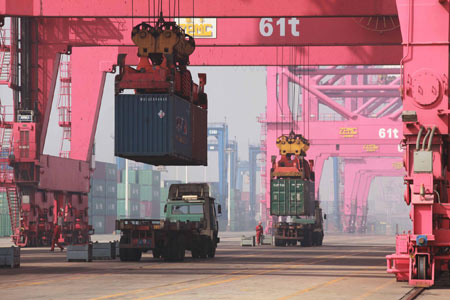Opinion
China reports largest trade deficit in 7 years
(Agencies)
Updated: 2011-03-10 14:13
 |
Large Medium Small |
China swung to a surprise trade deficit in February of $7.3 billion, its largest in seven years, as the Lunar New Year holiday dealt a sharper blow to export activity than had been expected.
|
 Workers unload containers at a port in Lianyungang, East China's Jiangsu province on March 8, 2011. [Photo/Xinhua]? |
It was China's first trade deficit since March last year and its biggest since February 2004. Economists, who had forecast a small surplus of $4.95 billion, said the sudden drop was likely to prove temporary.
"We did expect exports to slow last month, but I think nobody had expected such a weak outcome," said Nie Wen, an analyst at Hwabao Trust in Shanghai.
"There is little chance that China will have a trade deficit again, and the monthly trade surplus may pick up in the second half of this year," he added.
With tightening policies beginning to have an impact, China is confident that it can hold inflation to an average of 4 percent this year, Ma Jiantang, the government's statistics chief, said on Thursday.
His comments followed a report in an official newspaper that bank lending in February was much less than expected, indicating that Beijing has scored some success in reining in credit issuance, a crucial part of its campaign to control inflation.
Until that number is confirmed, though, attention will be squarely on China's precipitous drop in exports.
China exports grew 2.4 percent in February from a year earlier, the customs agency said on Thursday, well short of forecasts for a rise of 26.2 percent.
Imports increased 19.4 percent, missing market expectations of a 32.3 percent increase.
Holiday effect
The government has in the past pointed to a narrower trade surplus as evidence that it is making headway in tilting China away from excessive reliance on exports, a shift that is seen as a crucial part of putting the global economy on firmer footing.
But many economists cautioned against reading too much into one month's trade data, especially in the first quarter.
Chinese exports typically slump at the start of the year, with the country's factories shut or running at half speed for weeks because of China's New Year holiday, which fell in the first week of February.
"We believe the trade deficit is likely to be a temporary phenomenon distorted by the Lunar New Year. During the several weeks following the Lunar New Year, the holiday distortions affect exports much more than imports because exporters have a much greater tendency to take extended holidays," Yu Song and Helen Qian, economists with Goldman Sachs, said in a note.
| ||||
"Both imports and exports are lower than expected, and seasonal factors alone can't explain the sharp monthly drop," said Xu Biao, economist with China Merchants Bank in Shenzhen.
"It is definitely not a good sign. The size of imports is already read as a measure of domestic demand. But now imports have dropped significantly, and it points to a serious weakening in domestic economic activity," he said.
China ran a $6.5 billion trade surplus in January and averaged $15 billion a month last year.
With import growth set to outpace export growth, China was hoping to narrow its trade surplus for the third straight year, Commerce Minister Chen Deming said earlier this week.
China's trade surplus was $183 billion last year, down from $196 billion in 2009 and a record $295 billion in 2008.
Chen also said that the yuan was on "a gradual upward trend," but that there was no reason for it to move any faster. Although the yuan has been running near record highs against the dollar, it has only appreciated about 4 percent since being depegged last June.
| 分享按鈕 |



